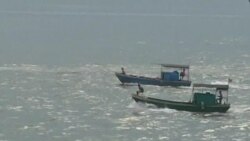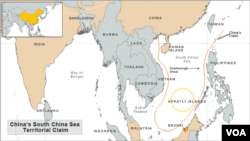BANGKOK, THAILAND —
China's increasing assertiveness about disputed territory in the South China Sea is posing a major challenge to unity in the Association of SouthEast Asian Nations. ASEAN summits this year in Cambodia failed to negotiate a much anticipated “code of conduct” and exposed splits between members. Indications are the competition for the resource-rich region is heating up.
Protests in Vietnam against China, as it asserts claim for almost all the South China Sea, an area rich in oil, gas, and fish.
New Chinese passports feature maps staking claims to much of the region. Authorities also have declared the right to stop and search ships in disputed waters.
Violation of international law
Philippines foreign affairs spokesman Raul Hernandez says that would violate international law.
" We will have problems with freedom of navigation and also lawful commerce," he said. "This would be a threat to all countries, not only in the region, but to all those countries that use these sea lanes of communication."
In April, ships from the Philippines and China had a tense two-month stand-off about fishing grounds in the Scarborough Shoals.
China's foreign ministry spokesman, Hong Lei, criticizes harassment of Chinese fishermen and Vietnam's exploration with India of disputed resources.
"China opposes unilateral oil and gas development in disputed waters of the South China Sea. We hope that concerned countries respect China's position and rights," he said.
Beijing has avoided discussing the issue with the Association of SouthEast Asian Nations, despite overlapping claims with four of its ten members - Brunei, Malaysia, the Philippines and Vietnam - as well as China and Taiwan.
ASEAN summits this year in Cambodia saw the host agree with China in quashing negotiations on a decade-old code of conduct in the South China Sea aimed at preventing conflict.
Indonesian Foreign Minister Marty Natalegawa cautions all parties against escalation, which he says appear aimed at preempting negotiations.
"They want to have a head start by having situations on the ground or situations at sea before that eventuality come about," he said. "And, this is what we need to … caution against. Because, then we will have a tit-for-tat type of situation."
Increasing tensions
ASEAN Secretary General Surin Pitsuwan says increasing tensions have complicated attempts for a peaceful solution.
"We have to be an honest broker. We have to be a neutral mechanism, effective mechanism of balancing various contending and competing interests who claim that they have legitimate interests in the issue," he said.
President Barack Obama, for the first time joined the East Asia Summit in Phnom Penh as part of the U.S. pivot to Asia. The increasing American presence in the region is welcomed by many as a counter-balance to China's influence.
Protests in Vietnam against China, as it asserts claim for almost all the South China Sea, an area rich in oil, gas, and fish.
New Chinese passports feature maps staking claims to much of the region. Authorities also have declared the right to stop and search ships in disputed waters.
Violation of international law
Philippines foreign affairs spokesman Raul Hernandez says that would violate international law.
" We will have problems with freedom of navigation and also lawful commerce," he said. "This would be a threat to all countries, not only in the region, but to all those countries that use these sea lanes of communication."
In April, ships from the Philippines and China had a tense two-month stand-off about fishing grounds in the Scarborough Shoals.
China's foreign ministry spokesman, Hong Lei, criticizes harassment of Chinese fishermen and Vietnam's exploration with India of disputed resources.
"China opposes unilateral oil and gas development in disputed waters of the South China Sea. We hope that concerned countries respect China's position and rights," he said.
Beijing has avoided discussing the issue with the Association of SouthEast Asian Nations, despite overlapping claims with four of its ten members - Brunei, Malaysia, the Philippines and Vietnam - as well as China and Taiwan.
ASEAN summits this year in Cambodia saw the host agree with China in quashing negotiations on a decade-old code of conduct in the South China Sea aimed at preventing conflict.
Indonesian Foreign Minister Marty Natalegawa cautions all parties against escalation, which he says appear aimed at preempting negotiations.
"They want to have a head start by having situations on the ground or situations at sea before that eventuality come about," he said. "And, this is what we need to … caution against. Because, then we will have a tit-for-tat type of situation."
Increasing tensions
ASEAN Secretary General Surin Pitsuwan says increasing tensions have complicated attempts for a peaceful solution.
"We have to be an honest broker. We have to be a neutral mechanism, effective mechanism of balancing various contending and competing interests who claim that they have legitimate interests in the issue," he said.
President Barack Obama, for the first time joined the East Asia Summit in Phnom Penh as part of the U.S. pivot to Asia. The increasing American presence in the region is welcomed by many as a counter-balance to China's influence.






